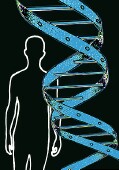
THURSDAY, Dec. 29 (HealthDay News) — Individuals may face a higher hereditary risk for developing pancreatic cancer if they carry abnormalities in the so-called “ATM” gene, new research reveals.
The finding, reported in an upcoming issue of Cancer Discovery, stems from genetic-sequencing work conducted among 166 pancreatic cancer patients. For comparative purposes, 190 other individuals who did not have pancreatic cancer also underwent sequencing.
The study was led by Alison Klein, an associate professor of oncology at the Sidney Kimmel Comprehensive Cancer Center at Johns Hopkins and director of the National Familial Pancreas Tumor Registry.
Noting that 10 percent of pancreatic cancer patients are from families in which more than one member has battled the disease, Klein pointed out in a news release from the American Association for Cancer Research that “there was significant reason to believe this clustering was due to genetics.”
But she added that no previous effort had “been able to find the causative genes that explained the cluster of pancreatic cancer for a majority of these families.”
Among the pancreatic cancer patients examined, four were found to have the ATM gene mutation. By contrast, none of the healthy individuals who were sequenced carried the abnormality, according to the report.
Ultimately, the finding could lead to the development of a new screening option for a disease that kills 95 percent of patients within five years of diagnosis, according to the release. Though endoscopy is under study as another possible screening tool, there are as yet no other recommended screening alternatives for the number four cause of cancer-related death.
More information
For more on pancreatic cancer, visit the U.S. National Library of Medicine.

